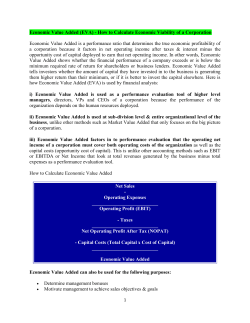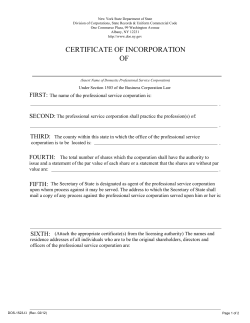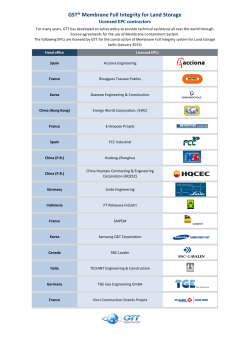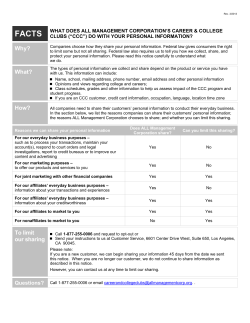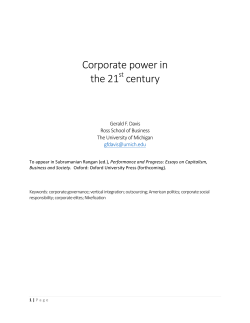
Benefit Corporation Directors and Officers FAQS
Benefit Corporation Directors and Officers FAQS Q. A. Q. A. Q. A. Q. A. Q. A. From the perspective of the directors and officers charged with managing a corporation, how does a benefit corporation differ from a traditional corporation? In order to answer that question, it is important to emphasize that the trend in modern corporate law is to view the corporation solely as an asset of its shareholders, so that directors and officers must manage that asset with the primary purpose of maximizing its value for the benefit of those shareholders. Thus, directors and officers must base decisions on the maximization of shareholder value without regard to the consequences on other stakeholders. How does being a benefit corporation change that? A benefit corporation has a modified purpose, so that directors and officers must consider the interests of other stakeholders in making their decisions, in addition to providing a return to shareholders. But don’t directors and officers in traditional corporations already consider other stakeholders? In one sense, managers already can take other stakeholders into account because doing so may ultimately be in the best interests of shareholders. However, in a traditional corporation, if the interests of shareholders conflict with the interests of other stakeholders, the managers are required to take the path that is best for the shareholders. Will shareholders get decreased returns in benefit corporations? Not necessarily. By committing to consider the interests of other stakeholders, a benefit corporation may create value through employee engagement, customer loyalty and similar attributes, thereby improving outcomes for all stakeholders including the owners. Furthermore, certain profit making opportunities may not be available without a true commitment to other stakeholders. How does this work in to daytoday decision making? In most cases, benefit corporation status is not likely to have a significant effect on the daytoday operations of a corporation. The fact is that corporations operate in an ecosystem where they constantly interact with a variety of stakeholders—customers, employees, suppliers, etc.—and that interaction requires that the interests of those stakeholders be considered, whether or not that consideration implicates the ultimate purpose of the corporation. Q. A. Q. A. Q. A. Q. A. Q. A. Q. But doesn’t the change in purpose imply that some decisions that affect stakeholders will be different than they would be in a traditional corporation? That will certainly be the case in some situations, but will generally involve policy decisions made at the board or Csuite level. And how will that policymaking element affect board function? In the first instance, the board will need to have information about how significant stakeholders are materially affected by corporate policy. The board in a traditional corporation already receives that type of information. In some cases this may be because the corporation has a sustainability reporting function. In others, it may simply be in the nature of operating a business to understand its effect on stakeholders. But will this increase the reporting requirements at the board level? For some corporations, it may. But, that is largely a function of what the corporation is already doing, and for some corporations there may already be adequate reporting to allow the board to set policy. How does the board decide on the right policy, given the multitude of stakeholder interests? The benefit corporation statutes require that the board “balance” or “consider” the various stakeholder interests. The statute does not prescribe what decisions the board must make. Although there is no case interpreting these statutes, the clear drafting intent was that the board would receive the benefit of the business judgment rule. This means that any rational disinterested decision should not be subject to challenge based on the interests of various stakeholders. What does that mean as a practical matter at the board level? Best practices will continue to evolve, but corporations that adopt the benefit corporation model will continue the movement that has already begun with environmental, social and governance reporting. There will be more discussions at the board level of the effects a particular policy or decision will have on various stakeholders, and the board will be empowered to take those effects into account when making decisions. How does this effect long term planning? 2 A. Q. A. Q. A. Q. A. Q. A. At a very practical level, benefit corporation status may allow directors to make decisions that, by benefiting stakeholders, actually create long term net present value for shareholders, without a concern for how those decisions affect short term market value. What about recordkeeping? Benefit corporations that are following best practices will be reporting against a third party standard, and the board should have full access to, and spend time discussing that report in depth. Where appropriate, the minutes should reflect the board’s consideration of stakeholder interests in its decionmaking. Will benefit corporation status add significant procedural requirements? While each situation may be different, in many cases there will not be significant additional procedural requirements because environmental, social and governance reporting is already a significant part of board function. Where it is not, that reporting may be the biggest additional procedural requirement. From the perspective of regular decision making and policy setting functions, there should not be significant additional procedural requirements, given the already integral role of stakeholders in corporate decision making. Can you provide an example to make this more concrete? What if the corporation on whose board I sit is deciding whether or not to acquire a new product line? In deciding whether to acquire a line of business, a benefit corporation would consider all the usual business issues, such as whether the product fits properly into the current business, what type of synergies would be created, etc. The company would also consider a variety of other stakeholder issues, such as the environmental footprint of the new product line, its role in the market, and its supply chain. These are elements that a longterm focused company is likely to consider in any event, but because the company is a benefit corporation, its mandate will specifically include consideration of these areas. Does that mean that the company would be prevented from acquiring the new line of business if the acquisition would create redundancy so that employees would lose jobs? Not at all. Not every decision needs to benefit every stakeholder; the board just needs to consider these varied interests. On the other hand, if the new line of business were profitable only because of a supply chain that operated in jurisdictions that permitted environmental degradation and child labor, the board might well make a decision not to acquire the line of business based on its negative effect on other stakeholders. 9012954.1 3
© Copyright 2025
